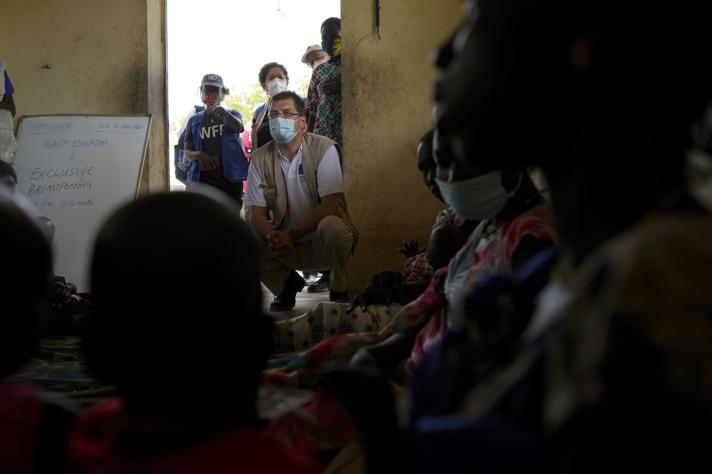Against the backdrop of the Covid-19 pandemic, an equally grave threat to the lives of millions of people is mounting — famine.
The latest ‘Global Report on Food Crises’, published this week, provides a stark overview of the challenges facing our most vulnerable communities. Like many people, I am alarmed by the levels of food insecurity reported in this year’s publication. In spite of recent calls for action and commitments to act in partnership, food scarcity is increasing, malnutrition is growing, and hunger levels are rising once again.
According to latest figures, almost 155 million individuals were in dire need of urgent food assistance by the beginning of 2021, bringing hunger to levels unheard of in recent times. With limited access to sufficient nutrition, over 30 million were struggling with emergency levels of food insecurity throughout the world. More worryingly, the threat of famine has returned to many parts of the world, with crises accelerating throughout South Sudan, Yemen and Afghanistan.
It is true that enormous inroads have been made into hunger over recent decades. Many humanitarian actors have established food-related assistance programmes to help provide relief to thousands of communities across the globe. For our part, the EU has and continues to support a range of food assistance interventions, allocating almost one quarter of our humanitarian aid budget to initiatives that aim to address acute malnutrition and urgent dietary needs.
But famine and hunger are now rarely due to food alone. They are often man-made, concentrated in countries affected by poor economies, weak governance structures, and large-scale, protracted conflicts. Recent climate shocks and the Covid-19 pandemic have only aggravated local conditions, adding fuel to the flames that were already blazing.
If we are to address this pressing plight and overcome the hurdles of hunger, the international community must do everything to reverse these worrying trends. We must make world food systems more sustainable and ensure that food assistance is provided to those most in need. There is no place for hunger in the twenty-first century. And as European Commissioner for Crisis Management, I am determined to decisively address the risk of famine and ensure that food security remains at the top of the global agenda.
First, it is clear that food insecurity is worsened by the reduction of humanitarian access. Parts of the Horn of Africa and the Central Sahel are appearing on the verge of famine due to limits on access into fragile areas of both regions. To avert catastrophe, it is essential to respect International Humanitarian Law in conflict-ridden regions across the globe and increase advocacy efforts to promote humanitarian access.
Second, food-related assistance remains a cornerstone of the EU’s humanitarian aid. Over the years, our supports have provided life-saving relief, including food, cash and vouchers, for people already suffering from acute malnutrition. It is paramount that these remain in place. As part of our commitment to combat global hunger, we will continue to provide critical aid and financial support to crisis-affected populations, especially those that are at risk of famine and acute food emergency.
Lastly, the promotion of more effective ways for providing humanitarian aid, for example through anticipatory approaches and preparedness, is crucial if we are to find durable, long-lasting solutions to the world’s nutrition crisis. As a global issue, it is essential that we co-ordinate our efforts, together with all development and peace-building partners. The Global Network against Food Crises was created specifically for this purpose. So we need to reinforce it and deploy it in all its dimensions. At the same time, we must work together to tackle both hunger and nutrition. And act in partnership with new and non-traditional donors to ensure that food systems become more inclusive and sustainable for all individuals.
This week, ministers from the G7 nations have convened to discuss famine prevention and global hunger. I am delighted to hear that they have proposed a compact of actions that will help countries to collectively fight famine over the course of the coming year. Whilst this will be very important, it will also not be enough. To avert famine and limit starvation, the international community will need to strengthen its actions and support all initiatives dedicated to the fight against worldwide hunger. For my part, I will continue to support all efforts devoted to alleviating the suffering that afflicts millions of people across the globe. In a world of plenty, where so much is available and on offer, it is time that we tackle this plight directly, with the goal of eradicating hunger once and for all.
Details
- Publication date
- 5 May 2021
- Author
- Directorate-General for Communication

